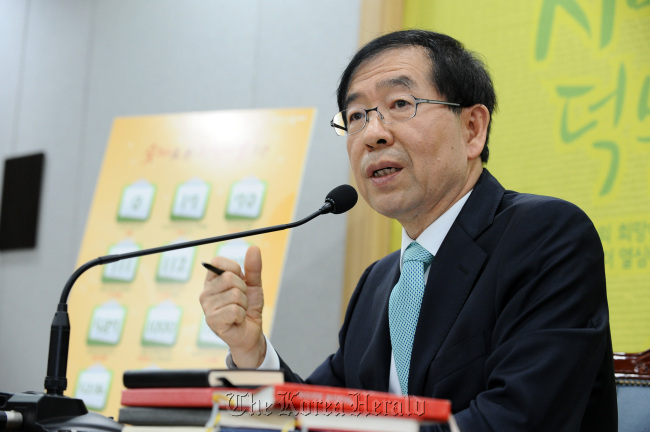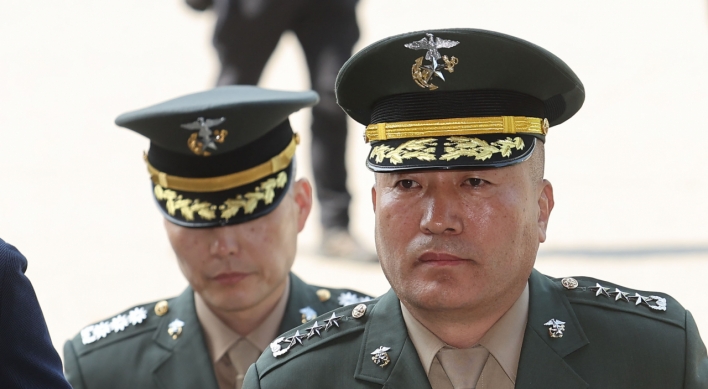Mayor’s first year in office focused mainly on welfare
By Korea HeraldPublished : Oct. 24, 2012 - 20:16
Seoul Mayor Park Won-soon pledged Wednesday to continue to focus on improving the welfare of low-income citizens and better protecting the environment as he marks his first year in office Saturday.
He took office by winning a by-election as an independent backed by grassroots civic groups and the main opposition Democratic United Party.
“I took office at a time of a grand paradigm shift. We should build a creative economy that focuses on the quality of life and welfare, breaking away from the era of fast growth,” he told reporters.
The mayor added that welfare, safety and jobs will continue to be his policy priorities.
He succeeded Oh Se-hoon who dishonorably stepped down after voters rejected a policy to scale down school meals.
The day after his inauguration, he approved the free meal service for all grade school students and first-year middle school students, a plan opposed by the former mayor and other critics citing efficiency as a reason.
Currently around 600,000 students at public elementary and middle schools benefit from the free meal service, and the city plans to make all students the beneficiaries by 2014.
Park halved the tuition fee of the city-run University of Seoul, which many critics called too radical. However, his decision was hailed by university students during the time when many of them were struggling with paying back student loans, some even resorting to using loan sharks.
He took office by winning a by-election as an independent backed by grassroots civic groups and the main opposition Democratic United Party.
“I took office at a time of a grand paradigm shift. We should build a creative economy that focuses on the quality of life and welfare, breaking away from the era of fast growth,” he told reporters.
The mayor added that welfare, safety and jobs will continue to be his policy priorities.
He succeeded Oh Se-hoon who dishonorably stepped down after voters rejected a policy to scale down school meals.
The day after his inauguration, he approved the free meal service for all grade school students and first-year middle school students, a plan opposed by the former mayor and other critics citing efficiency as a reason.
Currently around 600,000 students at public elementary and middle schools benefit from the free meal service, and the city plans to make all students the beneficiaries by 2014.
Park halved the tuition fee of the city-run University of Seoul, which many critics called too radical. However, his decision was hailed by university students during the time when many of them were struggling with paying back student loans, some even resorting to using loan sharks.

The city evaluates that the plan has normalized university education for students as more students are now able to spend more time in their study and less time in working part-time jobs for tuition fees. The number of students who use school loans has reduced by 40 percent from 1,040 in 2011 to 581 in 2012 at the University of Seoul.
The city has also granted regular worker status to 1,133 non-regular workers at the city government and subsidiary agencies.
Some development plans ground to a halt such as the Han River Renaissance, which was a flagship development project of former Mayor Oh to refurbish the capital’s river, and redevelopment plans for Seoul’s run down areas.
The Han River project was criticized by the opposition side including Mayor Park for its efficacy, huge amounts of cost and debt, and possible damage to the city environment.
However, the aftereffects of the pause of the plans, such as sunk costs and tailspins of the real estate and construction sectors, remained to be solved.
Around 28 billion won ($25 million) was spent in a plan to build an opera house on Nodeul Island in the Han River before Mayor Park scrapped it.
“The Han River is the source of life for Seoulites and the place of rest for them,” the mayor said at the press briefing.
“I do not want to approach issues related to projects in the river with biased ideas.”
He promised to open all the possible channels for the matters.
Redevelopment plans around the city have been a pain in the neck for many years. Park unveiled an exit plan which provides options for residents in the regions to decide whether they are going to proceed with the existing plan or not.
Once the redevelopment plans are canceled due to the objection of some residents, sunk costs cause financial burdens on the participants, mostly the union members for the plans.
The city believes the next central government will help to lessen the financial burdens as the presidential candidates are pledging for that, Mayor Park said.
The mayor added the municipal government will also try to make efforts to come up with creative solutions, such as helping the unions that bear the risk of sunk costs to make profits from other projects.
“I will stay for at least one week in Eunpyeong (northwestern Seoul), where conflicts have been constantly emerging even after the redevelopment was completed due to unsold homes to look for resolutions,” Park said.
Supplying 80,000 city-run houses, which will benefit the underprivileged families and a family of not more than two members, was one of his commitments.
The city has so far provided 16,000 houses and, Park said, he will continue to provide city-run houses.
One of his priorities for the environment is to reduce energy use up to 2 million tons of oil equivalent per year, the amount which can be generated by one nuclear power plant.
He took chairmanship of the ICLEI (International Council for Local Environmental initiatives), an international association of local cities and governments committed to climate change and sustainability in June and opened the headquarters of the environmental association.
The term of Mayor Park, who often makes use of social networks to communicate with around 590,000 followers, comes to an end in June 2014.
He promised that he will direct the “orchestra” Seoul well for the rest of his term.
He also said at the end of the Wednesday briefing that “citizens are the mayors.”
By Kim Young-won (wone0102@heraldcorp.com)
-
Articles by Korea Herald



















